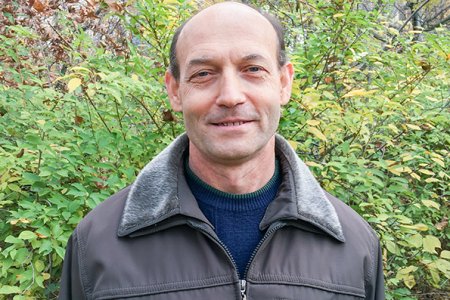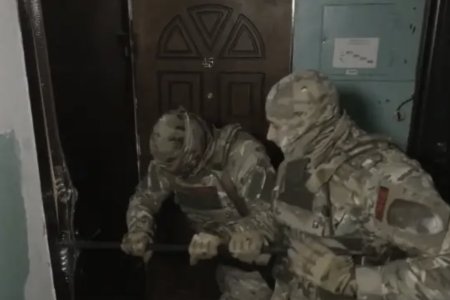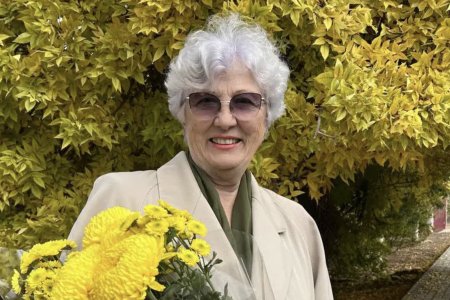
In a further sharp escalation of religious persecution under Russian occupation, the so-called ‘Crimean high court’ has turned the former suspended sentences against two Jehovah’s Witnesses into real, six-year, terms of imprisonment. There was never any justification for even the suspended sentences against Yury Herashchenko (b. 1979) and Serhiy Parfenovych (b. 1972) and it is possible that the change to a worse sentence at appeal level was always planned. Both men are married, with Parfenovych a father of six.
The appeal was lodged by the same Russian prosecutor who had, at the end of June 2024, demanded seven-year sentences against the two men and who claimed that a suspended six-year sentence was “not enough”. Despite the lack of any grounds, ‘judge’ Natalia Grebennikova and two colleagues from the occupation ‘Crimean high court’, chose to agree and, on 3 October, made the suspended sentences real. Herashchenko and Parfenovych were taken into custody in the courtroom.
During the hearing, their lawyers pointed out that the ‘evidence’ presented in ‘court’ proved solely that they were Jehovah’s Witnesses and that they had acted within the framework of freedom of religion, as set out in Russian law (as well as Russia’s commitments under international law).
The current Russian regime has tried to claim that its persecution of Jehovah’s Witnesses and members of some other faiths is not flagrant religious persecution by resorting to flawed and woolly ‘extremism’ legislation. Such persecution was effectively rubberstamped by the Russian supreme court’s ruling on 20 April 2017 outlawing the Jehovah’s Witnesses by declaring this world faith ‘an extremist organization’.
Russia has been illegally applying its legislation on occupied territory since 2014 and began using ‘extremism’ charges as a pretext for criminal prosecution against Jehovah’s Witnesses in 2018, with nine other Crimean believers already sentenced to six or more years’ imprisonment.
Armed Russian enforcement officers burst into the home of Serhiy Parfenovych in September 2022. After a six-hour search in the presence of his youngest child and his invalid father, Parfenovych was taken away by the FSB. He was held in detention for six weeks before being placed under house arrest. His prosecution was initiated by V. A. Novikov, who was already notorious for his role in the persecution of several believers from Yalta, including Taras and Darya Kuzio, a young couple with small children.
The charge brought against Parfenovych, then later, in March 2023, against Yury Herashchenko was of ‘organizing the activities of an extremist organization’ under Article 282.2 § 1 of Russia’s criminal code The indictment alone is a kind of admission of the crimes which Russia brought to Crimea. Parvenovych has been a Jehovah’s Witness since 1993, Herashchenko since the year 2000. Both men had practised their faith quite freely before Russia imposed its repressive measures on illegally occupied Ukrainian territory. They were accused of having organized the supposed “activities of an extremist organization” from April 2017, when Russia’s servile ‘supreme court’’ issued its ruling, until September 2022, when Parfenovych was arrested. Parfenovych was claimed to have been ‘the head of the highest body of management’ and ‘ideological leader’, with Heraschenko having supposedly helped him in this. Both men were alleged to have taken part in “coordinating the activities of adepts”, holding meetings both in real time and online to discuss religious literature, etc.
There is, firstly, no ‘ideological leader’ of any community of Jehovah’s Witnesses. Secondly, and most importantly, the charges against both men pertained purely to the ordinary activities of any believer. It is damning that such manifest persecution of believers for their faith was dealt with by ‘the investigative unit of the department for the investigation of particularly important cases’.
The ‘trial’ took place before ‘judge’ Valentin Vladimirovich Shukhalsky from the occupation ‘Krasnohvardiiske municipal court’. On 1 July 2024, both men were found ‘guilty’ but ‘only’ given six-year suspended sentences. As reported before, the principle of a ‘suspended’ sentence is that the person will go to prison if s/he ‘offends’ again. Here It is Russia as occupying state that is the offender, persecuting believers for studying the Bible and practising ones faith. Under such circumstances, a suspended sentence can become real whenever the enforcement bodies choose. This is also the second time that an initially milder sentence has been challenged by the prosecutor and turned into a real term of imprisonment. The aim of such prosecutions is to terrorize Jehovah’s Witnesses into renouncing their faith or leaving Crimea. Judging by the believers who regularly come to these appalling ‘court’ hearings to demonstrate their support, the occupation regime is not succeeding.



